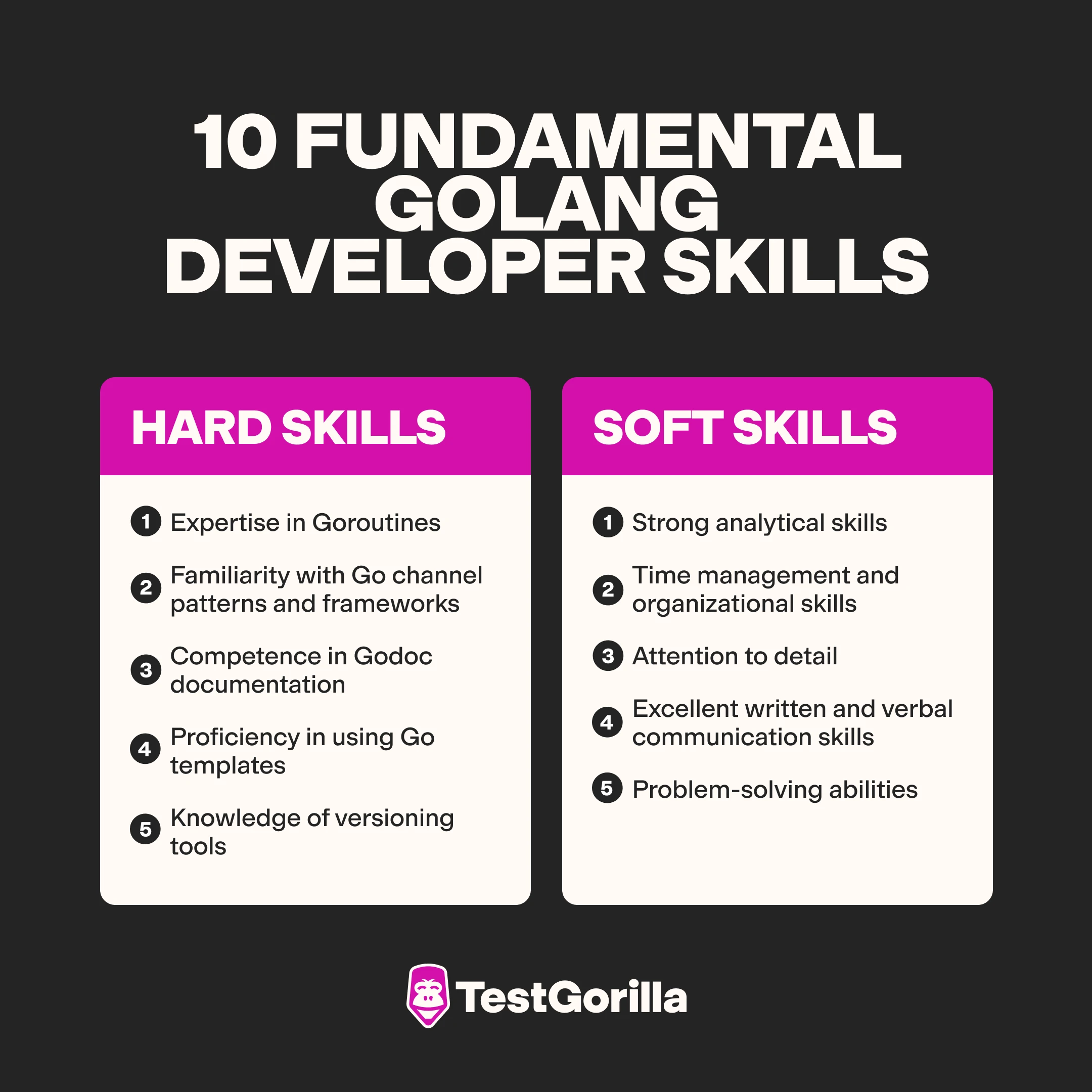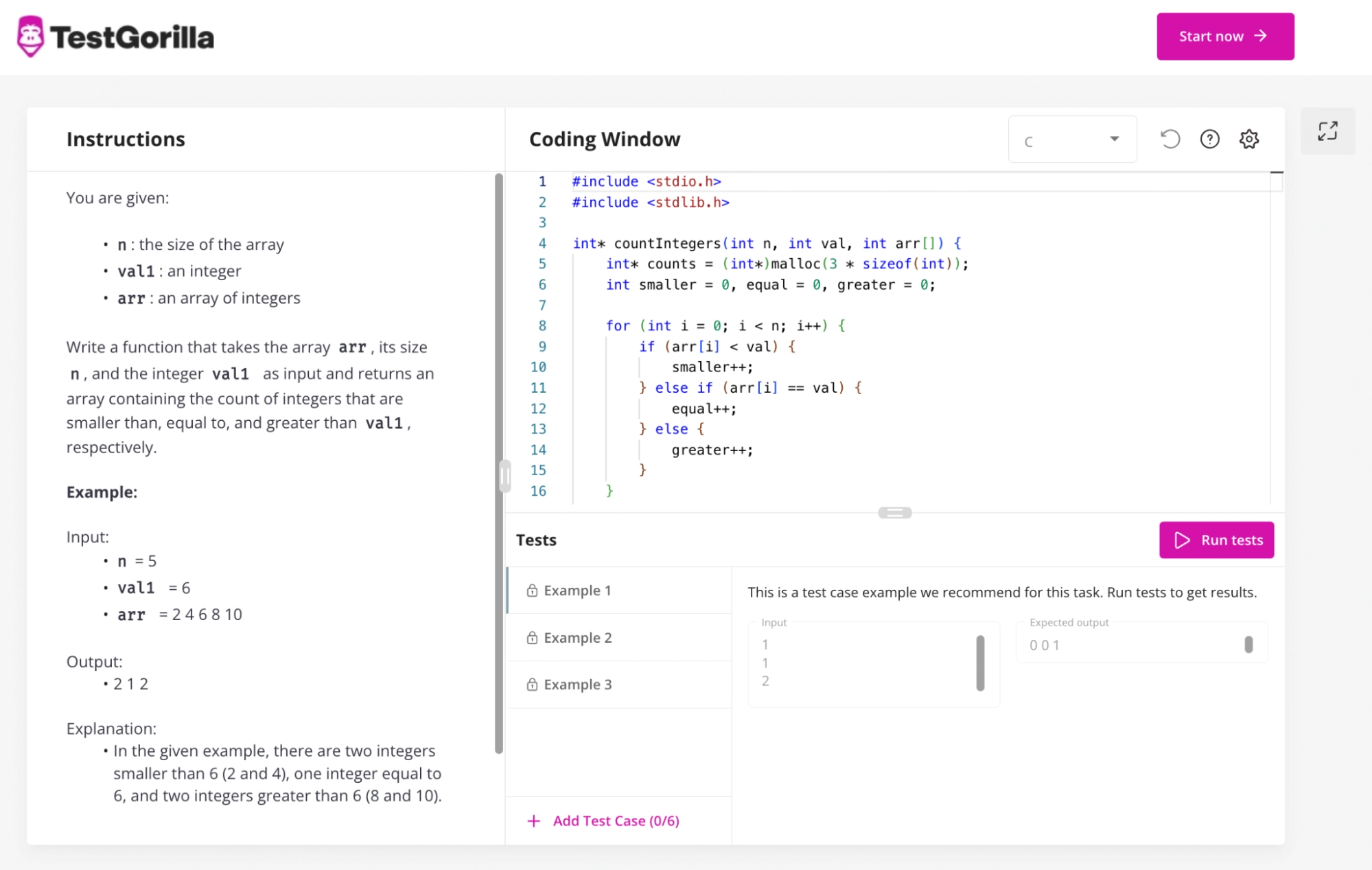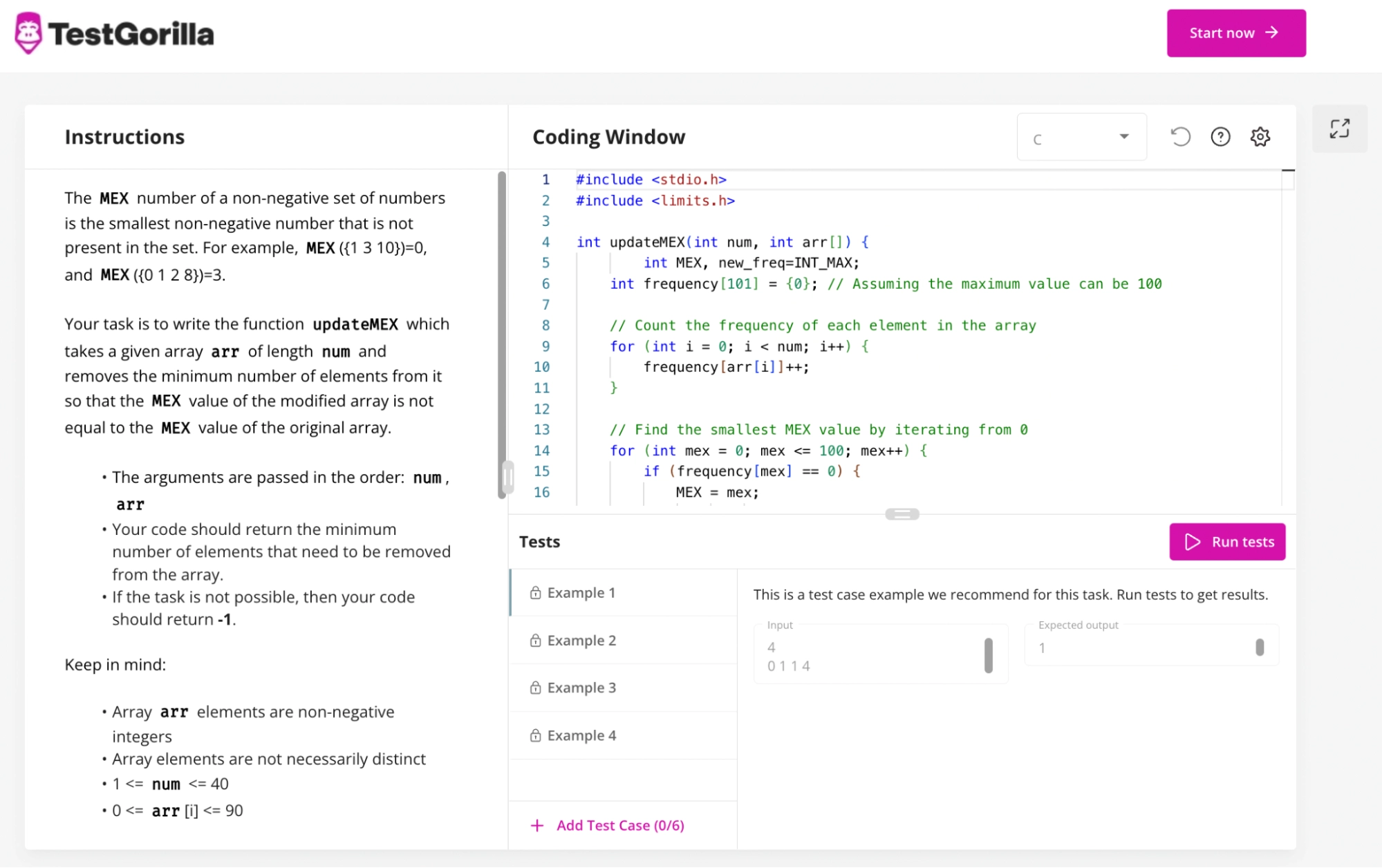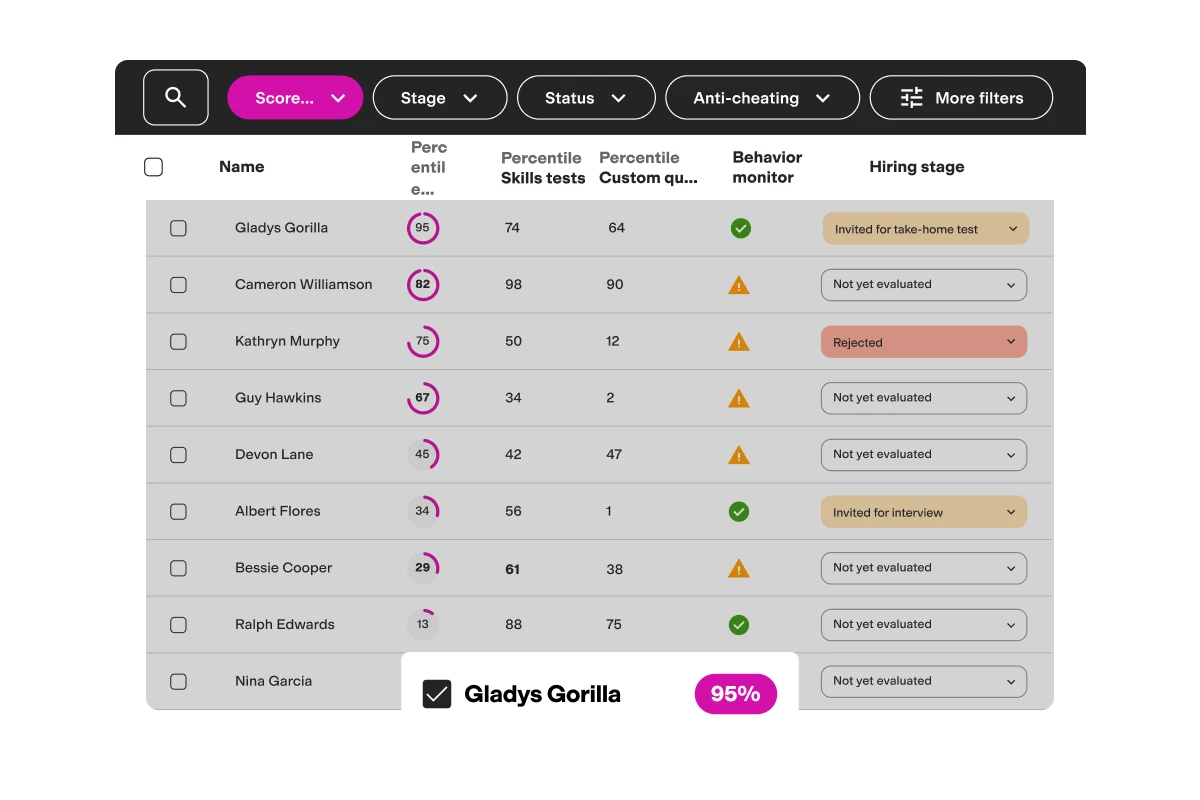Hire the best Golang developers for their skills, not their resumes.
Golang, or Go, is a fast and flexible programming language that’s gaining popularity with tons of recruiters. However, because it’s relatively young, the talent pool is small.
Therefore, you need an efficient Golang engineer hiring process to find and keep these rare experts engaged.
Do you know how to hire top Golang developers based on their skills? And are you sure about the best way to explore their talent in interviews?
Our guide explores:
Top Go developer skills to hire for
Where to find Golang dev professionals
Six steps for hiring the right Golang programmers
Table of contents
- What is a Golang developer or Golang engineer?
- Why should you hire Golang web developers?
- 10 fundamental Golang developer skills
- 6 steps on how to hire dedicated Golang developers
- How much does it cost to hire Golang developers?
- Hire a Golang developer and crack complex coding
- How to hire Golang developer professionals: FAQs
What is a Golang developer or Golang engineer?
Golang developers are programmers and software engineers who create code and build apps using the Go language. They design, test, and build programs for operating systems. Golang engineers debug code to ensure it works before it reaches web apps or mobile devices, using frameworks such as Revel, Gin, Fasthttp, and Echo.
Golang is one of the most popular programming languages among developers, mainly because it’s so flexible across web applications, mobile apps, and back-end development projects. It’s also widely used across industries, from e-commerce to healthcare.
That said, although Go is multipurpose, it mainly appeals to programmers working server-side. It’s great for large-scale and complex projects, but Golang's capabilities for front-end or full-stack development are relatively limited.
Why should you hire Golang web developers?
Are you working on large-scale projects or complex mobile app development? Chances are, you stand to benefit from a talented Go developer.
Golang is great for simplifying complex programming problems thanks to its “one problem – one solution” philosophy.
What’s more, Golang developers save time on tasks that usually take longer when using other languages, like Java.
For instance, Golang supports concurrency, meaning it helps programs to process several tasks at once. Essentially, by hiring a Golang developer, you can reduce processing time and tons of programming headaches.
Additionally, Golang is a compiled language, meaning its code converts directly into machine data.
Hiring a Golang expert means you can create new high-performance tools with scalability for your company, whether established or startup.
Don’t just take our word for it – most Go developers enjoy working with the open-source language.
A survey of Google’s Go team members found that 90% of devs were satisfied with Golang, with 52% being “very satisfied.”
The best insights on HR and recruitment, delivered to your inbox.
Biweekly updates. No spam. Unsubscribe any time.
10 fundamental Golang developer skills
Before you hire Golang developers, remember the best programmers have a mix of desirable hard and soft skills. Here’s what to look for:
Hard skills | Soft skills |
1. Expertise in Goroutines | 1. Strong analytical skills |
2. Familiarity with Go channel patterns and frameworks | 2. Time management and organizational skills |
3. Competence in Godoc documentation | 3. Attention to detail |
4. Proficiency in using Go templates | 4. Excellent written and verbal communication skills |
5. Knowledge of versioning tools | 5. Problem-solving abilities |
Go language developer hard skills
Hard skills revolve around technical ability, and the best coders balance these with interpersonal skills.
A good first step in hiring is to assess your candidates with a universal coding test– but you should always familiarize yourself with the skills your roles need first.
Let’s explore the technical skills to consider whenever you hire Golang web developer professionals.
1. Expertise in Goroutines
Goroutines help Go developers perform multiple tasks at once. This means functions can be carried out alongside other Goroutines in an app or program.
2. Familiarity with Go channel patterns and frameworks
Go channels help concurrent Goroutines share data. Ideally, your Go developer must be familiar with different channels and how to use them to set up frameworks.
3. Competence in Godoc documentation
Go comes with a built-in tool, Godoc, which scans source code for comments and collates them into documents.
The best Go developers are familiar with Godoc and its formatting rules, which help them create comments.
4. Proficiency in using Go templates
Go templates help developers create customized content for media such as web pages and emails. Your ideal hire should know syntax and how to parse templates from files.
5. Knowledge of versioning tools
Top Go developers know how to use versioning tools such as Git, SVN, and Mercurial, which help them revert to earlier code versions and use a common codebase.
Go language developer soft skills
Soft and interpersonal skills help people do a great job. When you hire dedicated Golang developers, you’re looking for team players and proactive go-getters, not just technical experts.
1. Strong analytical skills
Go developers need strong analytical mindsets and critical-thinking skills to solve problems quickly. The best hires spot hidden opportunities while working under pressure, too.
2. Time management and organizational skills
Go developers are masters at organizing time to track tasks. These skills help developers manage backlogs and keep control, meaning development processes, standards, practices, and procedures improve over time.
3. Attention to detail
Programming software is a complex art. Therefore, the best Go developers are precise and discerning.
The ideal Go developer candidate can show you how they test and review to make sure their code more than meets project requirements.
4. Excellent written and verbal communication skills
Your ideal Go guru needs strong written and verbal communication skills. After all, they share complex details with different audiences, meaning they must confidently translate their work.
5. Problem-solving abilities
Golang devs often solve complex technical challenges while creating apps and programs. Strong problem-solving skills and agile thinking help them react and find the best possible answers under pressure.
Learn how to use TestGorilla to measure Golang developer skills
One of our friendly experts is on hand to demonstrate the benefits of using talent assessments to hire skilled developers.
6 steps on how to hire dedicated Golang developers
Knowing the skills to prioritize when you hire Golang developer professionals is all well and good, but let’s start putting a hiring plan into practice.
Steps | In brief |
1. Define your Golang dev job profile | Be clear about the skills you need and what the role demands to attract the right people |
2. Craft and publish your job description | Build an appealing job profile and publish it where Go developers are likely to see it |
3. Evaluate applicants with a Golang skills assessment | Use skills tests to avoid bias and let candidates prove their talents |
4. Analyze assessment results | Break down how applicants scored on individual tests |
5. Schedule interviews | Reach out to the best performers and interview them on their hard and soft skills |
6. Select the right candidate and extend an offer | Choose the people you want to hire, be clear on what they can expect, and be kind to applicants who weren’t chosen |
1. Define your Golang dev job profile
Essentially, your dev job profile shows your candidate what the position looks like at a glance. It should include clear details about the projects you’re hiring for, and any areas of responsibility.
Always be precise about what you need – after all, Golang devs have different backgrounds and specialized skill sets.
You could talk to programmers on the development team you’re hiring for and get their take on what details you should include in the profile.
Finally, decide on the salary range you can offer the successful candidate, including benefits, bonuses, and perks.
2. Craft and publish your job description
Now that you’ve defined the role, it’s time to write a winning job description.
We recommend reading our guide to Golang developer job descriptions, but here’s a shortcut.
Always include:
Well-defined job title
Overview of the role
Introduction to your company
Details about working conditions, like remote options and time zone
Information about the relevant skills, competencies, and experience needed
Information about compensation, benefits, and perks
Project length, if appropriate
Scope of work required
Details about the hiring process
After a bit of editing, it’s time to publish. Check out the following recruitment platforms:
GitHub: Great for hiring top freelance developers directly
TopTal: Ideal for thoroughly vetting Go freelancers, as it only approves around 3% of candidates
Stack Overflow: A popular resource for developers with its own job board
Freelancer: A marketplace where freelancers can “bid” for your job
3. Evaluate applicants with a Golang skills assessment
Reading resumes is time-consuming and easily leads to biased and unreliable candidate selection.
Skills-based hiring, however, is much more reliable at helping you find the best Golang developers.
Take our own story as an example: By assessing engineers on their hard skills, soft skills, and personalities, we now confidently welcome top applicants to interview within three to four days of contacting us.
With TestGorilla’s software, it’s easy to begin creating talent assessments for your candidates around your ideal hire. In fact, we offer pre-designed, role-specific Golang skills tests.
For example, our Go (Coding): Entry-Level Algorithms test judges candidates’ basic programming skills by asking them to program a small Go algorithm:
For more senior developers, our Go (Coding): Intermediate Problems Online test gives candidates 30 minutes to develop a solution to a problem:
Note: You can experiment with a preview of the Intermediate Go test for yourself for free.
We also let you add up to five tests to an assessment, including other job-related or soft-skills tests, personality tests, cognitive ability tests, and situational judgment tests to help you dig deeper into what makes your applicants tick.
You can add customized questions, assign points to different questions, and add qualifying questions, too.
Once your assessment is ready, invite candidates to complete it through links in the job application form or email.
Unlock the power of talent assessments with TestGorilla
Getting started with TestGorilla is easy and 100% free. All you need to do is sign up and start planning your project managers’ next assessment.
4. Analyze assessment results
It’s time to decide who to move forward to the interview stage.
TestGorilla ranks people from high to low based on their average scores and breaks down how they score in certain areas. This way, it’s easy to see your most skilled developers at a glance:
Now, give each candidate a star rating and record notes. From here, you can whittle down the candidates you want to interview.
5. Schedule interviews
Now’s the time to reach out to the best performers and invite them to interview.
Use a structured interview process and let candidates know what to expect, such as the date, time, location, and duration.
Building an effective Go language developer interview means asking questions that give you a clear idea of who you’re considering.
Use open-ended questions and create scenarios. For instance, you could ask the following to measure their hard skills:
“Explain what a Go interface is.”
“Take me through when you last used a Go workspace.”
“Which Go operators have you used previously, and how?”
“When did you last use a dynamic-type variable declaration in Go?”
“Which of Go’s built-in supports do you find most useful, and why?”
For soft skills, ask:
“What’s your process for designing a Go function from scratch?”
“Talk me through a difficult project and how you resolved it with Go.”
“Explore a time when you had to balance several programming tasks and how you succeeded.”
“What are some of your favorite Go programming language projects over the years?”
“Discuss a programming project where you needed to collaborate with others – what was the outcome?”
Check out our list of 50 Golang interview questions for more inspiration.
6. Select the right candidate and extend an offer
You’re finally ready to choose a candidate.
When you make an offer, include details of the compensation and benefits package, any evaluation period information, and the expected start date.
Finally, give constructive feedback to prospects who weren’t selected. The candidate experience should be positive even if they don’t get hired this time. What if they want to apply with you again in the future?
How much does it cost to hire Golang developers?
The average salary of a Golang dev in the US is around $132,500 at present.
However, factors such as role seniority, project length, temporary or permanent employment, location, and skill set can all change what you pay them.
Pricing may change whether fixed or hourly rate. Figures may also vary depending on years of experience or status as full-time, part-time, in-house, or freelance.
Make sure you budget for advertising, interviewing, onboarding, and training.
Hire a Golang developer and crack complex coding
The best Golang engineers are great at solving even the most puzzling programming problems. However, there’s a process for hiring the right experts for your team.
When you hire a Golang developer using skills tests, you tap into their coding mastery, what motivates them, and whether or not they’re a good addition to your team and culture.
You can’t tell whether or not you’re hiring a rockstar Golang dev on their resume alone.
So, take advantage of TestGorilla’s assessment tools and build a more precise, efficient hiring process. For the complete 360, check out our product tour.
Beyond that, we’d love to show you some customization tips and tricks – so book a free 30-minute demo and enjoy the show.
Of course, if you want to dive straight in and play around with tests yourself, register for a TestGorilla free forever plan and get started.
How to hire Golang developer professionals: FAQs
Let’s close our guide on how to hire Golang developer professionals with some commonly asked queries.
What are the main Golang developer job responsibilities?
Writing efficient, scalable, and easily maintainable Go code
Planning and tracking development and documenting coding
Identifying and fixing bugs
Maintaining development service standards, practices, and procedures
Using various Go frameworks
Designing and building cloud-based microservices
Collaborating with designers, developers, architects, and project managers
Reviewing code
What are the main job requirements when looking to hire a Golang developer?
Experience developing distributed systems, APIs, workflows, concurrency, multithreading, and synchronization
Understanding of common Goroutine and channel patterns
Knowledge of Go templating, common frameworks, standard libraries, and tools
Familiarity with software development tools (i.e., Docker, Kubernetes), other programming languages (i.e JavaScript, TypeScript), and technologies (i.e., Blockchain, DevOps)
Proficiency with relational databases such as SQL
Insights in developing, designing, implementing, and running microservices in cloud environments, like AWS and GCP, at scale
Strong written, verbal, and interpersonal communication skills
Which is better, Python or Golang?
Golang is the more efficient programming language of the two, but Python is arguably simpler to get used to.
However, many developers prefer Go because it’s cleaner, safer, easier to scale, and faster to run several programs simultaneously. Golang and Python are highly sought-after as specialized programming languages, but many see Python as an “entry-level” choice.
You've scrolled this far
Why not try TestGorilla for free, and see what happens when you put skills first.



























